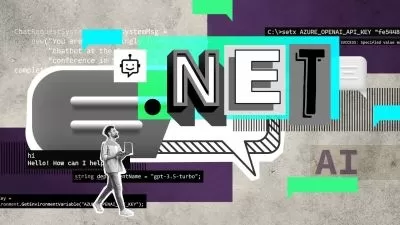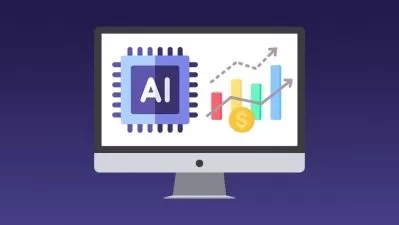About Artificial IntelligenceLearn More
Artificial intelligence (AI) is the principle of simulating human intelligence with computers programmed to emulate human thought patterns and mimic their actions. Technology in this field grows day by day, steering use into the future by predicting situations and helping to solve complex problems. Artificial Intelligence courses on Udemy teach you the core concepts behind the technologies that drive AI.
Sort by:
Sorting
The newest
Most visited
Course time
Subtitle
Frequently asked questions about Artificial Intelligence
Artificial intelligence (AI) enables computers to imitate human-like intelligence. Artificial intelligence has been around since the 1950s, and the field has dramatically evolved since then. Access to more and better information (data) and improvements in computing have helped advance the field. AI technology enables software, apps, and machines to learn, think, and correct themselves the same way humans do. Humans must first set up the system and develop the set of rules to be followed (algorithms), then computer programs use algorithms to analyze data, find patterns, and act on what they discover. AI programs become more accurate as they receive and process more data. A large part of AI involves machine learning, which allows computers to understand and copy human behavior by finding data patterns. In short, AI technology helps us do our jobs better and easier.
Artificial intelligence (AI) is useful for a variety of tasks across many industries. It powers virtual assistants, like Amazon’s Alexa and Apple’s Siri, and helps computers understand which emails are spam. Machines already handle monotonous jobs. You may have used AI when contacting a customer service representative using a website chatbot or when searching for a term on Google, and the search engine finished the word for you. AI also helps online stores and streaming services provide personalized recommendations. In healthcare, artificial intelligence can help doctors find potential medical issues faster, including tumors, broken bones, and genetic conditions. AI also helps wayfinding apps route drivers around high-traffic areas, financial institutions flag potentially fraudulent credit card transactions, and retailers keep track of their stock more efficiently. If you have a robot vacuum, a self-driving car, or play chess against a computer, that’s artificial intelligence, too.
To learn about artificial intelligence (AI), you should love math and science. You should have a basic understanding of computer science and statistics. Critical thinking and problem-solving skills are necessary, as is a curious, innovative spirit. You should be interested in learning how things work. It also helps if you understand how information (data) is collected, stored, and analyzed and how humans can use AI to improve our quality of life. Other skills include an interest in or understanding of software engineering, data structures, algorithms, natural language, computer programming, computer architecture, probability, and data modeling. You should be able to work at a fast pace. As in most fields, a willingness to learn, ask questions, and work both independently and in teams are important traits.
There isn’t one “best” coding language for writing artificial intelligence (AI) programs. The chosen language will need to build AI algorithms and networks that can analyze data and adapt to reflect what it learns. The best option will depend on the type of project and what it needs to accomplish. The end use of the program, including how fast it needs to function and what other programs and platforms it will need to work with, will also help determine which language is best. Languages commonly used in AI programming include Python, C++, R Language, JavaScript, Prolog, Artificial Intelligence Markup Language (AIML), MATLAB, Haskell, LISP, and Julia, among others.
Many careers use artificial intelligence, including data analysts, algorithm developers, software developers, computer scientists, hardware technicians, natural language engineers, user experience (UX) designers, research scientists, and software analysts. Some tech companies hire specifically for AI roles with titles like artificial intelligence engineer or Siri programmer. Most companies need AI experts to help them apply the technology to their businesses because artificial intelligence is prevalent in nearly every industry. Companies in the healthcare, retail, travel, shipping, finance, banking, call center, manufacturing, entertainment, automotive, housewares, and even animal conservation fields are implementing artificial intelligence technology.
Start your career search by reading job descriptions to get a feel for the specific qualifications you’ll need. Employers typically require that those working in the artificial intelligence field have a bachelor’s degree in computer science. Look for educational programs and Udemy courses on topics like machine learning, deep learning, data science, coding, programming, statistics, mathematical algorithms, robotics, graphical modeling, probability, logic, cognitive learning theory, language processing, data structures, quantum computing, or cognitive science to increase your knowledge about artificial intelligence. Hands-on experience with AI applications and machine-learning technology also is helpful. Once you are proficient in building AI projects, share your work on public forums to get feedback and attract prospective employers. Because the field of artificial intelligence is continually evolving, keep reading and learning to keep your skills sharp.




















